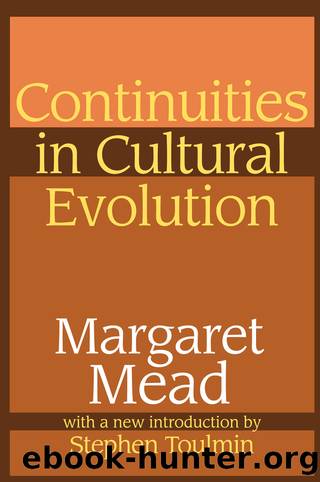Continuities in Cultural Evolution by Margaret Mead & Stephen Toulmin

Author:Margaret Mead & Stephen Toulmin
Language: eng
Format: epub
Publisher: Routledge
Part III
10. The Conditions of Conscious Participation in the Evolutionary Process
INCREASINGLY in recent years thinkers concerned with contemporary problems have sought a place for man in the evolutionary process in which he is no longer the wholly unconscious or the half-conscious most recent development in a cosmic process but instead, having obtained some understanding of the nature of evolution, begins himself to direct its course.1 Yet all too frequently discussion of the problem breaks down because of unexplored differences in the viewpoint of those who are temperamentally inclined to think in terms of controlling the processes of nature and of those who are temperamentally inclined to envisage a role for man which is dependent on cooperative understanding of some cosmic design. At one extreme are those who, arguing for control, foresee that as man gains greater knowledge of genetics it will be possible by gene manipulation to control the kinds of individuals who will be born, or that, with a greater knowledge of drugs, it will be possible to control population size, or, in more elaborate fantasies, that it will be possible by the propagation of test-tube tissue to order a dozen "Churchills" to fill the needs of a dozen political posi-tions.2 The other extreme is best represented by the prophets of apocalyptic cults and by those who, accepting man's limitations, see history as a set of recurrent cycles, each as futile as the last, or see man's role as that of a gambler, taking a desperate chance on a seat in Heaven, or see man as a static figure, elegantly and pessimistically living out his existence.
We may examine these two versions of man's future possibilities in terms of their contemporary reference. Until the time when biological research has advanced far enough so that control can be assumed over plants, animals, and men, there are very few steps that can be recommended. One of these would be to make the modifications in the educational system that are necessary to produce more scientists to work on the problem. Meanwhile, the daydream of biological control has the reverse effect of a kind of nightmare, an alarming depiction of a world to come in which practically no one now alive would wish to live. The daydreamers themselves do not speak of genetic control as something by which they too would be controlled; instead, they picture men and women like themselves, in some future age, manipulating the germ plasm of others in ways guaranteed to improve the caliber of mankind to a point where problem solving on a huge scale would be very easy to accomplish.3
The suggestion that we replace man's long, slow, fumbling attempts to control the environment and to develop styles of life wherein he becomes increasingly more human by automatic controls of various kinds—including not only those resulting from breeding or propagation but also those resulting from the application of somewhat crude and only partly known rules of behavior to a conditioning process—is an image that functions in the present as a deterrent to enthusiastic commitment to the future.
Download
This site does not store any files on its server. We only index and link to content provided by other sites. Please contact the content providers to delete copyright contents if any and email us, we'll remove relevant links or contents immediately.
| Anthropology | Archaeology |
| Philosophy | Politics & Government |
| Social Sciences | Sociology |
| Women's Studies |
Born to Run: by Christopher McDougall(7127)
The Leavers by Lisa Ko(6948)
iGen by Jean M. Twenge(5416)
Sapiens by Yuval Noah Harari(5370)
Spare by Prince Harry The Duke of Sussex(5197)
The Kite Runner by Khaled Hosseini(5179)
Machine Learning at Scale with H2O by Gregory Keys | David Whiting(4313)
Bullshit Jobs by David Graeber(4190)
Never by Ken Follett(3957)
Goodbye Paradise(3810)
Livewired by David Eagleman(3774)
Fairy Tale by Stephen King(3399)
A Dictionary of Sociology by Unknown(3085)
Harry Potter 4 - Harry Potter and The Goblet of Fire by J.K.Rowling(3074)
The Social Psychology of Inequality by Unknown(3031)
The Club by A.L. Brooks(2925)
Will by Will Smith(2920)
0041152001443424520 .pdf by Unknown(2846)
People of the Earth: An Introduction to World Prehistory by Dr. Brian Fagan & Nadia Durrani(2736)
